Related Research Articles

Robert Leroy Johnson was an American blues musician and songwriter. His landmark recordings in 1936 and 1937 display a combination of singing, guitar skills, and songwriting talent that has influenced later generations of musicians. Although his recording career spanned only seven months, he is recognized as a master of the blues, particularly the Delta blues style, and as one of the most influential musicians of the 20th century. The Rock and Roll Hall of Fame describes him as perhaps "the first ever rock star".
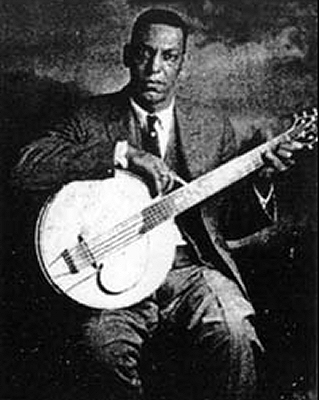
William Henry "Papa Charlie" Jackson was an early American bluesman and songster who accompanied himself with a banjo guitar, a guitar, or a ukulele. His recording career began in 1924. Much of his life remains a mystery, but his draft card lists his birthplace as New Orleans, Louisiana, and his death certificate states that he died in Chicago, Illinois, on May 7, 1938.

Charlie Patton, more often spelled Charley Patton, was an American Delta blues musician and songwriter. Considered by many to be the "Father of the Delta Blues", he created an enduring body of American music and inspired most Delta blues musicians. The musicologist Robert Palmer considered him one of the most important American musicians of the twentieth century.

"Kind Hearted Woman Blues" is a blues song recorded on November 23, 1936, in San Antonio, Texas, by the American Delta bluesman Robert Johnson. The song was originally released on 78 rpm format as Vocalion 03416 and ARC 7-03-56. Johnson performed the song in the key of A, and recorded two takes, the first of which contains his only recorded guitar solo. Both takes were used for different pressings of both the Vocalion issue and the ARC issue. The first take (SA-2580-1) can be found on many compilation albums, including the first one, King of the Delta Blues Singers (1961). Take 2 (SA-2580-2) can be heard on the later compilation Robert Johnson, The Complete Recordings (1990).
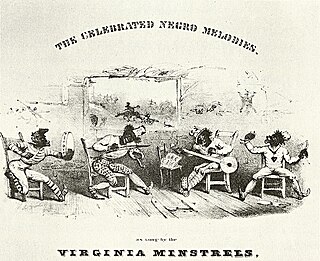
Hokum is a particular song type of American blues music—a song which uses extended analogies or euphemistic terms to make humorous, sexual innuendos. This trope goes back to early dirty blues recordings, enjoyed huge commercial success in the 1920s and 1930s, and is used from time to time in modern American blues and blues rock.

"Sweet Home Chicago" is a blues standard first recorded by Robert Johnson in 1936. Although he is often credited as the songwriter, several songs have been identified as precedents. The song has become a popular anthem for the city of Chicago despite ambiguity in Johnson's original lyrics. Numerous artists have interpreted the song in a variety of styles.
"Salty Dog Blues" is a folk song from the early 1900s. Musicians have recorded it in a number of styles, including blues, jazz, country music, bluegrass. Papa Charlie Jackson recorded an adaptation for Paramount and Broadway in 1924. According to Jas Obrecht, "Old-time New Orleans musicians from Buddy Bolden’s era recalled hearing far filthier versions of 'Salty Dog Blues' long before Papa Charlie’s recording." Similar versions were recorded by Mississippi John Hurt and Lead Belly.
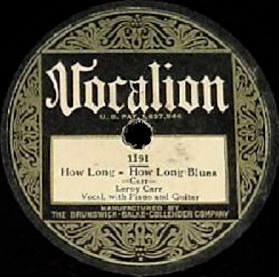
"How Long, How Long Blues" is a blues song recorded by the American blues duo Leroy Carr and Scrapper Blackwell in 1928. It became an early blues standard and its melody inspired many later songs.

"Come On in My Kitchen" is a blues song by Robert Johnson. Music writer Elijah Wald has described it as "a hypnotic lament" and "his first unquestionable masterpiece".

Jim Jackson was an American blues and hokum singer, songster, and guitarist, whose recordings in the late 1920s were popular and influential on later musicians.
Dirty blues is a form of blues music that deals with socially taboo and obscene subjects, often referring to sexual acts and drug use. Because of the sometimes graphic subject matter, such music was often banned from radio and available only on jukeboxes. The style was most popular in the years before World War II, although it experienced a revival in the early 1950s.
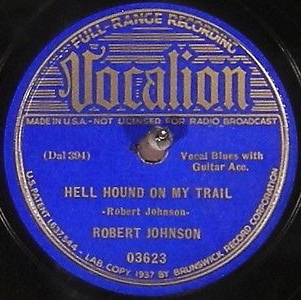
"Hellhound on My Trail" is a blues song recorded by Mississippi Delta bluesman Robert Johnson in June 1937 and released as a 78 rpm single on Vocalion Records that September. It was inspired by earlier blues songs and blues historian Ted Gioia describes it as one of Johnson's "best known and most admired performances—many would say it is his greatest".

"Jim Jackson's Kansas City Blues" is a 1927 song, written and recorded by the American blues musician Jim Jackson. He recorded it on October 10, 1927 for Vocalion Records, who released it as a two-part A-side and B-side single. It was Jackson's first record and an early blues hit. Music writer Peter Silvester suggests it was one of the first million-seller records. This sales figure is disputed, but the recording was "immensely popular... and became a standard among Mississippi and Memphis bluesmen".
"Ramblin' on My Mind" is a blues song recorded on November 23, 1936, by Delta blues musician Robert Johnson. He recorded two takes of the song, which were used for different pressings of the 78 rpm records issued by both the Vocalion and ARC record companies.

"Bottle Up and Go" or "Bottle It Up and Go" is a song that is a standard of the blues. Based on earlier songs, Delta bluesman Tommy McClennan recorded "Bottle It Up and Go" in 1939. The song has been interpreted and recorded by numerous artists, sometimes using alternate titles, such as "Step It Up and Go", "Shake It Up and Go", etc.
Dorothea Trowbridge, first name also spelled Dorthea, Doretha, was an American blues singer active in St. Louis in the 1930s. A few recordings by her remain, at least one of which includes lyrics on the theme of "grinding".
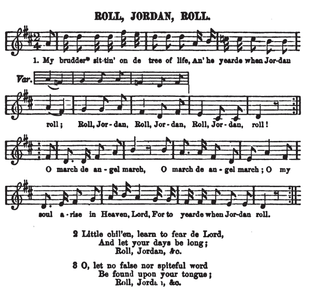
"Roll, Jordan, Roll", also "Roll, Jordan", is a spiritual created by enslaved African Americans, developed from a song written by Isaac Watts in the 18th century which became well known among slaves in the United States during the 19th century. Appropriated as a coded message for escape, by the end of the American Civil War it had become known through much of the eastern United States. In the 19th century, it helped inspire blues, and it remains a staple in gospel music.
"Georgia Grind" is a jazz and dirty blues tune, written by Spencer Williams and copyrighted by him in 1926. The lyrics were added by Bud Allen. A recording was released by Louis Armstrong with his Hot Five by Okeh Records on a 78 rpm, mono 10" shellac single record in April 1926. The melody was the same as used in the song, "Shake That Thing", written in 1925 by Papa Charlie Jackson.
"It's Tight Like That" is a hokum or dirty blues song, recorded by Tampa Red and Georgia Tom on October 24, 1928. Vocalion Records issued it on the then standard 10-inch 78 rpm shellac record in December 1928. It became successful and eventually sold over seven million copies.
"Hokum Boys" was the billing of multiple jazz bands active in 1920s and 1930s. The hokum subgenre of blues music got its name from these bands.
References
- ↑ Komara 2015.
- 1 2 3 4 Schwartz 2018, p. 370.
- ↑ Johnson 1927, p. 16.
- 1 2 3 Calt 2010, p. 212.
- ↑ Birnbaum 2012, p. 105.
- ↑ Wald 2010, p. 5.
- 1 2 Birnbaum 2013, p. 77.
- 1 2 Hansen 2000, p. 46.
- 1 2 3 Dodge 2019, p. 115.
- 1 2 Obrecht 2015, p. 41.
- ↑ Dixon, Godrich & Rye 1997, p. 423.
- ↑ Wald 2010, p. 27.
- ↑ Kellner, Bruce (1992). "Langston Hughes's 'Nigger Heaven' Blues". The Langston Hughes Review. 11 (1): 21–27. JSTOR 26434554.
- ↑ Schwartz 2018, pp. 383–388.